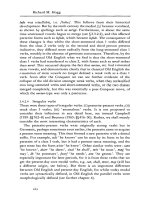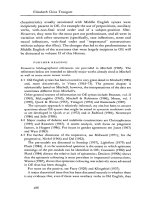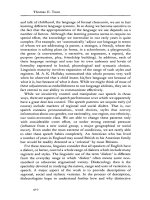the bastiat collection volume 1 phần 8 ppsx
Bạn đang xem bản rút gọn của tài liệu. Xem và tải ngay bản đầy đủ của tài liệu tại đây (166.55 KB, 46 trang )
VII.
ECONOMIC SOPHISMS—
S
ECOND SERIES
Social Fallacies 2 Front matter.qxd 7/6/2007 10:59 AM Page 305
Social Fallacies 2 Front matter.qxd 7/6/2007 10:59 AM Page 306
1
NATURAL HISTORY OF SPOLIATION
hy do I give myself up to that dry science, political
economy?
The question is a proper one. All labor is so repugnant in its
nature that one has the right to ask of what use it is.
Let us examine and see.
I do not address myself to those philosophers who, if not in
their own names, at least in the name of humanity, profess to
adore poverty.
I speak to those who hold wealth in esteem—and understand
by this word, not the opulence of the few, but the comfort, the
well-being, the security, the independence, the instruction, the
dignity of all.
There are only two ways by which the means essential to the
preservation, the adornment and the perfection of life may be
obtained—production and spoliation. Some persons may say:
“Spoliation is an accident, a local and transient abuse, denounced
307
W
Social Fallacies 2 Chap One.qxd 7/6/2007 10:59 AM Page 307
by morality, punished by the law, and unworthy of the attention
of political economy.”
Still, however benevolent or optimistic one may be, he is com-
pelled to admit that spoliation is practiced on so vast a scale in
this world, and is so generally connected with all great human
events, that no social science, and least of all political economy,
can refuse to consider it.
I go farther. That which prevents the perfection of the social
system (at least in so far as it is capable of perfection) is the con-
stant effort of its members to live and prosper at the expense of
each other. So that, if spoliation did not exist, society being per-
fect, the social sciences would be without an object.
I go still farther. When spoliation becomes a means of subsis-
tence for a body of men united by social ties, in course of time
they make a law that sanctions it, a morality that glorifies it.
It is enough to name some of the best defined forms of spoli-
ation to indicate the position it occupies in human affairs.
First comes war. Among savages the conqueror kills the con-
quered to obtain an uncontested, if not incontestable, right to
game.
Next slavery. When man learns that he can make the earth
fruitful by labor, he makes this division with his brother: “You
work and I eat.”
Then comes superstition. “According as you give or refuse me
that which is yours, I will open to you the gates of heaven or of
hell.”
Finally, monopoly appears. Its distinguishing characteristic is
to allow the existence of the grand social law—service for serv-
ice—while it brings the element of force into the discussion, and
thus alters the just proportion between service received and serv-
ice rendered.
Spoliation always bears within itself the germ of its own
destruction. Very rarely the many despoil the few. In such a case
the latter soon become so reduced that they can no longer satisfy
the cupidity of the former, and spoliation ceases for want of sus-
tenance.
308 The Bastiat Collection
Social Fallacies 2 Chap One.qxd 7/6/2007 10:59 AM Page 308
Almost always the few oppress the many, and in that case spo-
liation is none the less undermined, for, if it has force as an agent,
as in war and slavery, it is natural that force in the end should be
on the side of the greater number. And if deception is the agent,
as with superstition and monopoly, it is natural that the many
should ultimately become enlightened.
Another law of Providence wars against spoliation. It is this:
Spoliation not only displaces wealth, but always destroys a
portion.
War annihilates values.
Slavery paralyzes the faculties.
Monopoly transfers wealth from one pocket to another, but it
always occasions the loss of a portion in the transfer.
This is an admirable law. Without it, provided the strength of
oppressors and oppressed were equal, spoliation would have no
end.
A moment comes when the destruction of wealth is such that
the despoiler is poorer than he would have been if he had re-
mained honest.
So it is with a people when a war costs more than the booty
is worth; with a master who pays more for slave labor than for
free labor; with a priesthood which has so stupefied the people
and destroyed its energy that nothing more can be gotten out of
it; with a monopoly which increases its attempts at absorption as
there is less to absorb, just as the difficulty of milking increases
with the emptiness of the udder.
Monopoly is a species of the genus spoliation. It has many
varieties, among them sinecure, privilege, and restriction upon
trade.
Some of the forms it assumes are simple and naive, like feudal
rights. Under this regime the masses are despoiled, and know it.
Other forms are more complicated. Often the masses are
plundered, and do not know it. It may even happen that they be-
lieve that they owe every thing to spoliation, not only what is left
them but what is taken from them, and what is lost in the oper-
ation. I also assert that, in the course of time, thanks to the
Economic Sophisms—Second Series 309
Social Fallacies 2 Chap One.qxd 7/6/2007 10:59 AM Page 309
310 The Bastiat Collection
ingenious machinery of habit, many people become spoilers with-
out knowing it or wishing it. Monopolies of this kind are begotten
by fraud and nurtured by error. They vanish only before the light.
I have said enough to indicate that political economy has a
manifest practical use. It is the torch that, unveiling deceit and
dissipating error, destroys that social disorder called spoliation.
Someone, a woman I believe, has correctly defined it as “the
safety-lock upon the property of the people.”
C
OMMENTARY
If this little book were destined to live three or four thousand
years, to be read and re-read, pondered and studied, phrase by
phrase, word by word, and letter by letter, from generation to
generation, like a new Koran; if it were to fill the libraries of the
world with avalanches of annotations, explanations and para-
phrases, I might leave to their fate, in their rather obscure con-
ciseness, the thoughts that precede. But since they need a com-
mentary, it seems wise to me to furnish it myself.
The true and equitable law of humanity is the free exchange
of service for service. Spoliation consists in destroying by force or
by trickery the freedom of exchange, in order to receive a service
without rendering one.
Forcible spoliation is exercised thus: Wait till a man has pro-
duced something; then take it away from him by violence.
It is solemnly condemned in the Ten Commandments: Thou
shalt not steal.
When practiced by one individual on another, it is called rob-
bery, and leads to the prison; when practiced among nations, it
takes the name of conquest, and leads to glory.
Why this difference? It is worth while to search for the cause.
It will reveal to us an irresistible power, public opinion, which,
like the atmosphere, envelopes us so completely that we do not
notice it. Rousseau never said a truer thing than this: “A great deal
of philosophy is needed to understand the facts that are very near
to us.”
Social Fallacies 2 Chap One.qxd 7/6/2007 10:59 AM Page 310
The robber, for the reason that he acts alone, has public opin-
ion against him. He terrifies all who are about him. Yet, if he has
companions, he boasts to them on his exploits, and here we may
begin to notice the power of public opinion, for the approbation
of his band serves to obliterate all consciousness of his turpitude,
and even to make him proud of it. The warrior lives in a differ-
ent atmosphere. The public opinion that would rebuke him is
among the vanquished. He does not feel its influence. But the
opinion of those by whom he is surrounded approves his acts and
sustains him. He and his comrades are vividly conscious of the
common interest that unites them. The country, which has cre-
ated enemies and dangers, needs to stimulate the courage of its
children. To the most daring, to those who have enlarged the
frontiers, and gathered the spoils of war, are given honors, repu-
tation, glory. Poets sing their exploits. Fair women weave garlands
for them. And such is the power of public opinion that it sepa-
rates the idea of injustice from spoliation, and even rids the
despoiler of the consciousness of his wrong-doing.
The public opinion that reacts against military spoliation, (as
it exists among the conquered and not among the conquering
people) has very little influence. But it is not entirely powerless.
It gains in strength as nations come together and understand one
another better. Thus, it can be seen that the study of languages
and the free communication of peoples tend to bring about the
supremacy of an opinion opposed to this sort of spoliation.
Unfortunately, it often happens that the nations adjacent to a
plundering people are themselves spoilers when opportunity
offers, and hence are imbued with the same prejudices.
Then there is only one remedy—time. It is necessary that
nations learn by harsh experience the enormous disadvantage of
despoiling each other.
You say there is another restraint—moral influences. But
moral influences have for their object the increase of virtuous
actions. How can they restrain these acts of spoliation when these
very acts are raised by public opinion to the level of the highest
virtues? Is there a more potent moral influence than religion? Has
Economic Sophisms—Second Series 311
Social Fallacies 2 Chap One.qxd 7/6/2007 10:59 AM Page 311
there ever been a religion more favorable to peace or more uni-
versally received than Christianity? And yet what has been wit-
nessed during eighteen centuries? Men have gone out to battle,
not merely in spite of religion, but in the very name of religion.
A conquering nation does not always wage offensive war. Its
soldiers are obliged to protect the hearthstones, the property, the
families, the independence and liberty of their native land. At
such a time war assumes a character of sanctity and grandeur. The
flag, blessed by the ministers of the God of Peace, represents all
that is sacred on earth; the people rally to it as the living image of
their country and their honor; the warlike virtues are exalted
above all others. When the danger is over, the opinion remains,
and by a natural reaction of that spirit of vengeance that con-
founds itself with patriotism, they love to bear the cherished flag
from capital to capital. It seems that nature has thus prepared the
punishment of the aggressor.
It is the fear of this punishment, and not the progress of phi-
losophy, that keeps arms in the arsenals, for it cannot be denied
that those people who are most advanced in civilization make
war, and bother themselves very little with justice when they have
no reprisals to fear. Witness the Himalayas, the Atlas, and the
Caucasus.
If religion has been impotent, if philosophy is powerless, how
is war to cease?
Political economy demonstrates that even if the victors alone
are considered, war is always begun in the interest of the few, and
at the expense of the many. All that is needed, then, is that the
masses should clearly perceive this truth. The weight of public
opinion, which is yet divided, would then be cast entirely on the
side of peace.
Forcible spoliation also takes another form. Without waiting
for a man to produce something in order to rob him, they take
possession of the man himself, deprive him of his freedom, and
force him to work. They do not say to him, “If you will do this
for me, I will do that for you,” but they say to him, “You take all
the troubles; we, all the enjoyments.” This is slavery.
312 The Bastiat Collection
Social Fallacies 2 Chap One.qxd 7/6/2007 10:59 AM Page 312
Now it is important to inquire whether it is not in the nature
of uncontrolled power always to abuse itself.
For my part I have no doubt of it, and should as soon expect
to see the power that could arrest a stone in falling proceed from
the stone itself, as to trust force within any defined limits.
I should like to be shown a country where slavery has been
abolished by the voluntary action of the masters.
Slavery furnishes a second striking example of the impotence
of philosophical and religious sentiments in a conflict with the
energetic activity of self interest.
This may seem sad to some modern schools which seek the
reformation of society in self-denial. Let them begin by reforming
the nature of man.
In the West Indies the masters, from father to son, have, since
slavery was established, professed the Christian religion. Many
times a day they repeat these words: “All men are brothers. Love
thy neighbor as thyself; in this are the law and the prophets ful-
filled.” Yet they hold slaves, and nothing seems to them more
legitimate or natural. Do modern reformers hope that their moral
creed will ever be as universally accepted, as popular, as authori-
tative, or as often on all lips as the Gospel? If that has not passed
from the lips to the heart, over or through the great barrier of
self-interest, how can they hope that their system will work this
miracle?
Well, then, is slavery invulnerable? No; self-interest, which
founded it, will one day destroy it, provided the special interests
that have created it do not stifle those general interests that tend
to overthrow it.
Another truth demonstrated by political economy is that free
labor is progressive, and slave labor stationary. Hence the triumph
of the first over the second is inevitable. What has become of the
cultivation of indigo by the blacks?
Free labor, applied to the production of sugar, is constant-
ly causing a reduction in the price. Slave property is becoming
proportionately less valuable to the master. Slavery will soon die
out in the West Indies unless the price of sugar is artificially raised
Economic Sophisms—Second Series 313
Social Fallacies 2 Chap One.qxd 7/6/2007 10:59 AM Page 313
by legislation. Accordingly we see today the masters, their credi-
tors and representatives, making vigorous efforts to maintain
these laws, which are the pillars of the edifice.
Unfortunately they still have the sympathy of people among
whom slavery has disappeared, from which circumstances the
sovereignty of public opinion may again be observed. If public
opinion is sovereign in the domain of force, it is much more so in
the domain of fraud. Fraud is its proper sphere. Stratagem is the
abuse of intelligence. Imposture on the part of the despoiler
implies credulity on the part of the despoiled, and the natural
antidote of credulity is truth. It follows that to enlighten the mind
is to deprive this species of spoliation of its support.
I will briefly pass in review a few of the different kinds of spo-
liation that are practiced on an exceedingly large scale. The first
which presents itself is spoliation through the avenue of supersti-
tion. In what does it consist? In the exchange of food, clothing,
luxury, distinction, influence, power—substantial services for fic-
titious services. If I tell a man: “I will render you an immediate
service,” I am obliged to keep my word, or he would soon know
what to depend upon, and my trickery would be unmasked.
But if I should tell him, “In exchange for your services I will
do you immense service, not in this world but in another; after
this life you may be eternally happy or miserable, and that happi-
ness or misery depends upon me; I am a vicar between God and
man, and can open to you the gates of heaven or of hell,” if that
man believes me he is at my mercy.
This method of imposture has been very extensively practiced
since the beginning of the world, and it is well known what
omnipotence the Egyptian priests attained by such means.
It is easy to see how impostors proceed. It is enough to ask
one’s self what he would do in their place.
If I, entertaining views of this kind, had arrived in the midst
of an ignorant population, and were to succeed by some extra-
ordinary act or marvelous appearance in passing myself off as a
supernatural being, I would claim to be a messenger from God,
having an absolute control over the future destinies of men.
314 The Bastiat Collection
Social Fallacies 2 Chap One.qxd 7/6/2007 10:59 AM Page 314
Then I would forbid all examination of my claims. I would go
still farther, and, as reason would be my most dangerous enemy,
I would interdict the use of reason—at least as applied to this dan-
gerous subject. I would taboo, as the savages say, this question,
and all those connected with it. To question them, discuss them,
or even think of them, should be an unpardonable crime.
Certainly it would be the acme of arts thus to put the barrier
of the taboo upon all intellectual avenues which might lead to the
discovery of my imposture. What better guarantee of its perpetu-
ity than to make even doubt sacrilege?
However, I would add accessory guarantees to this funda-
mental one. For instance, in order that knowledge might never be
disseminated among the masses, I would appropriate to myself
and my accomplices the monopoly of the sciences. I would hide
them under the veil of a dead language and hieroglyphic writing;
and, in order that no danger might take me unawares, I would be
careful to invent some ceremony which day by day would give me
access to the privacy of all consciences.
It would not be amiss for me to supply some of the real wants
of my people, especially if by doing so I could add to my influ-
ence and authority. For instance, men need education and moral
teaching, and I would be the source of both. Thus I would guide
as I pleased the minds and hearts of my people. I would join
morality to my authority by an indissoluble chain, and I would
proclaim that one could not exist without the other, so that if any
audacious individual attempted to meddle with a tabooed ques-
tion, society, which cannot exist without morality, would feel the
very earth tremble under its feet, and would turn its wrath upon
the rash innovator.
When things have come to this pass, it is plain that these peo-
ple are more mine than if they were my slaves. The slave curses
his chain, but my people will bless theirs, and I shall succeed in
stamping, not on their foreheads, but in the very center of their
consciences, the seal of slavery.
Economic Sophisms—Second Series 315
Social Fallacies 2 Chap One.qxd 7/6/2007 10:59 AM Page 315
Public opinion alone can overturn such a structure of iniquity;
but where can it begin, if each stone is tabooed? It is the work of
time and the printing press.
God forbid that I should seek to disturb those consoling
beliefs that link this life of sorrows to a life of felicity. But, that
the irresistible longing that attracts us toward religion has been
abused, no one, not even the Head of Christianity, can deny.
There is, it seems to me, one sign by which you can know whether
the people are or are not dupes. Examine religion and the priest,
and see whether the priest is the instrument of religion, or reli-
gion the instrument of the priest.
If the priest is the instrument of religion, if his only thought
is to disseminate its morality and its benefits on the earth, he will
be gentle, tolerant, humble, charitable, and full of zeal; his life
will reflect that of his divine model; he will preach liberty and
equality among men, and peace and fraternity among nations; he
will repel the allurements of temporal power, and will not ally
himself with that which, of all things in this world, has the most
need of restraint; he will be the man of the people, the man of
good advice and tender consolations, the man of public opinion,
the man of the Evangelist.
If, on the contrary, religion is the instrument of the priest, he
will treat it as one does an instrument which is changed, bent and
twisted in all ways so as to get out of it the greatest possible
advantage for one’s self. He will multiply tabooed questions; his
morality will be as flexible as seasons, men, and circumstances.
He will seek to impose on humanity by gesticulations and studied
attitudes; a hundred times a day he will mumble over words
whose sense has evaporated and which have become empty con-
ventionalities. He will traffic in holy things, but just enough not
to shake faith in their sanctity, and he will take care that the more
intelligent the people are, the less open shall the traffic be. He will
take part in the intrigues of the world, and he will always side with
the powerful, on the simple condition that they side with him. In
a word, it will be easy to see in all his actions that he does not
desire to advance religion by the clergy, but the clergy by religion,
316 The Bastiat Collection
Social Fallacies 2 Chap One.qxd 7/6/2007 10:59 AM Page 316
and as so many efforts indicate an object, and as this object
according to the hypothesis, can be only power and wealth, the
decisive proof that the people are dupes is when the priest is rich
and powerful.
It is very plain that a true religion can be abused as well as a
false one. The higher its authority the greater the fear that it may
be severely tested. But there is much difference in the results.
Abuse always stirs up to revolt the sound, enlightened, intelligent
portion of a people. This inevitably weakens faith, and the weak-
ening of a true religion is far more lamentable than of a false one.
This kind of spoliation, and popular enlightenment, are always in
an inverse ratio to one another, for it is in the nature of abuses to
go as far as possible. Not that pure and devoted priests cannot be
found in the midst of the most ignorant population, but how can
the knave be prevented from donning the cassock and nursing the
ambitious hope of wearing the mitre? Despoilers obey the
Malthusian law; they multiply with the means of existence, and
the means of existence of knaves is the credulity of their dupes.
Turn whichever way you please, you always find need of an
enlightened public opinion. There is no other antidote.
Another species of spoliation is commercial fraud, a term that
seems to me too limited because the tradesman who changes his
weights and measures is not alone culpable, but also the physician
who receives a fee for evil counsel, the lawyer who provokes liti-
gation, etc. In the exchange of two services one may be of less
value than the other, but when the service received is that which
has been agreed upon, it is evident that spoliation of that nature
will diminish with the increase of public intelligence.
The next in order is the abuse in the public service—an im-
mense field of spoliation, so immense that we can give it but par-
tial consideration.
If God had made man a solitary animal, everyone would labor
for himself. Individual wealth would be in proportion to the serv-
ices each one rendered to himself. But since man is a social ani-
mal, one service is exchanged for another. A proposition you can
transpose if it suits you.
Economic Sophisms—Second Series 317
Social Fallacies 2 Chap One.qxd 7/6/2007 10:59 AM Page 317
In society there are certain requirements so general, so univer-
sal in their nature, that provision has been made for them in the
organizing of the public service. Among these is the necessity of
security. Society agrees to compensate in services of a different
nature those who render it the service of guarding the public
safety. In this there is nothing contrary to the principles of polit-
ical economy. Do this for me, I will do that for you. The princi-
ple of the transaction is the same, although the process is differ-
ent, but the circumstance has great significance.
In private transactions each individual remains the judge both
of the service he renders and of that which he receives. He can
always decline an exchange, or negotiate elsewhere. There is no
necessity of an interchange of services, except by previous volun-
tary agreement. Such is not the case with the State, especially
before the establishment of representative government. Whether
or not we require its services, whether they are good or bad, we
are obliged to accept such as are offered and to pay the price.
It is the tendency of all men to magnify their own services and
to disparage services rendered them, and private matters would
be poorly regulated if there was not some standard of value. This
guarantee we have not (or we hardly have it), in public affairs. But
still society, composed of men, however strongly the contrary
may be insinuated, obeys the universal tendency. The government
wishes to serve us a great deal, much more than we desire, and
forces us to acknowledge as a real service that which sometimes
is widely different, and this is done for the purpose of demanding
contributions from us in return.
The State is also subject to the law of Malthus. It is con-
tinually living beyond its means, it increases in proportion to its
means, and draws its support solely from the substance of the
people. Woe to the people who are incapable of limiting the
sphere of action of the State. Liberty, private activity, riches, well-
being, independence, dignity, depend upon this.
There is one circumstance that must be noticed: Chief among
the services we ask of the State is security. That it may guaran-
tee this to us it must control a force capable of overcoming all
318 The Bastiat Collection
Social Fallacies 2 Chap One.qxd 7/6/2007 10:59 AM Page 318
individual or collective domestic or foreign forces that might
endanger it. Combined with that fatal disposition among men to
live at the expense of each other, which we have before noticed,
this fact suggests a danger patent to all.
You will accordingly observe on what an immense scale spoli-
ation, by the abuses and excesses of the government, has been
practiced.
If one should ask what service has been rendered the public,
and what return has been made therefor, by such governments as
Assyria, Babylon, Egypt, Rome, Persia, Turkey, China, Russia,
England, Spain and France, he would be astonished at the enor-
mous disparity.
At last representative government was invented, and, a priori,
one might have believed that the disorder would have ceased as if
by enchantment.
The principle of these governments is this:
“The people themselves, by their representatives, shall decide
as to the nature and extent of the public service and the remuner-
ation for those services.”
The tendency to appropriate the property of another, and the
desire to defend one’s own, are thus brought in contact. One
might suppose that the latter would overcome the former. As-
suredly I am convinced that the latter will finally prevail, but we
must concede that thus far it has not.
Why? For a very simple reason. Governments have had too
much sagacity; people too little.
Governments are skillful. They act methodically, consecu-
tively, on a well concerted plan, which is constantly improved by
tradition and experience. They study men and their passions. If
they perceive, for instance, that they have warlike instincts, they
incite and inflame this fatal propensity. They surround the nation
with dangers through the conduct of diplomats, and then natu-
rally ask for soldiers, sailors, arsenals and fortifications. Often
they have but the trouble of accepting them. Then they have pen-
sions, places, and promotions to offer. All this calls for money.
Hence loans and taxes.
Economic Sophisms—Second Series 319
Social Fallacies 2 Chap One.qxd 7/6/2007 10:59 AM Page 319
If the nation is generous, the government proposes to cure all
the ills of humanity. It promises to increase commerce, to make
agriculture prosperous, to develop manufactures, to encourage
letters and arts, to banish misery, etc. All that is necessary is to
create offices and to pay public functionaries.
In other words, their tactics consist in presenting as actual
services things that are but hindrances; then the nation pays, not
for being served, but for being subservient. Governments assum-
ing gigantic proportions end by absorbing half of all the revenues.
The people are astonished that while marvelous labor-saving
inventions, destined to infinitely multiply productions, are ever
increasing in number, they are obliged to toil on as painfully as
ever, and remain as poor as before.
This happens because, while the government manifests so much
ability, the people show so little. Thus, when they are called upon
to choose their agents, those who are to determine the sphere of,
and compensation for, governmental action whom do they choose?
The agents of the government. They entrust the executive power
with the determination of the limit of its activity and its require-
ments. They are like the Bourgeois Gentilhomme, who referred the
selection and number of his suits of clothes to his tailor.
However, things go from bad to worse, and at last the people
open their eyes, not to the remedy, for there is none as yet, but to
the evil.
Governing is so pleasant a trade that everybody desires to
engage in it. Thus the advisers of the people do not cease to say:
“We see your sufferings, and we weep over them. It would be oth-
erwise if we governed you.”
This period, which usually lasts for some time, is one of re-
bellions and insurrections. When the people are conquered, the
expenses of the war are added to their burdens. When they
conquer, there is a change of those who govern, and the abuses
remain.
This lasts until the people learn to know and defend their true
interests. Thus we always come back to this: there is no remedy
but in the progress of public intelligence.
320 The Bastiat Collection
Social Fallacies 2 Chap One.qxd 7/6/2007 10:59 AM Page 320
Certain nations seem remarkably inclined to become the prey
of governmental spoliation. They are those where men, not con-
sidering their own dignity and energy, would believe themselves
lost if they were not governed and administered upon in all
things. Without having traveled much, I have seen countries
where they think agriculture can make no progress unless the
State keeps up experimental farms; that there will presently be no
horses if the State has no stables; and that fathers will not have
their children educated, or will teach them only immoralities, if
the State does not decide what it is proper to learn. In such a
country revolutions may rapidly succeed one another, and one set
of rulers after another be overturned. But the governed are none
the less governed at the caprice and mercy of their rulers, until
the people see that it is better to leave the greatest possible num-
ber of services in the category of those which the parties inter-
ested exchange after a fair discussion of the price.
We have seen that society is an exchange of services, and
should be but an exchange of good and honest ones. But we have
also proven that men have a great interest in exaggerating the rel-
ative value of the services they render one another. I cannot
indeed, see any other limit to these claims than the free accept-
ance or free refusal of those to whom these services are offered.
Hence it comes that certain men resort to the law to curtail
the natural prerogatives of this liberty. This kind of spoliation is
called privilege or monopoly. We will carefully indicate its origin
and character.
Everyone knows that the services he offers in the general mar-
ket are the more valued and better paid for, the scarcer they are.
Each one, then, will ask for the enactment of a law to keep out of
the market all who offer services similar to his.
When the monopoly is an isolated fact, it never fails to enrich
the person to whom the law has granted it. It may then happen
that each class of workmen, instead of seeking the overthrow of
this monopoly, claim a similar one for themselves. This kind of
spoliation, thus reduced to a system, becomes then the most
ridiculous of illusions for everyone, and the definite result is that
Economic Sophisms—Second Series 321
Social Fallacies 2 Chap One.qxd 7/6/2007 10:59 AM Page 321
each one believes that he gains more from a general market
impoverished by all.
It is not necessary to add that this singular regime also brings
about an universal antagonism between all classes, all professions,
and all peoples; that it requires the constant but always uncertain
interference of government; that it swarms with the abuses that
have been the subject of the preceding paragraph; that it places all
industrial pursuits in hopeless insecurity; and that it accustoms
men to place upon the law, and not upon themselves, the respon-
sibility for their very existence. It would be difficult to imagine a
more active cause of social disturbance.
J
USTIFICATION
It may be asked, “Why this ugly word—spoliation? It is not
only coarse, but it wounds and irritates; it turns calm and moder-
ate men against you, and embitters the controversy.”
I earnestly declare that I respect individuals; I believe in the
sincerity of almost all the friends of Protection, and I do not claim
that I have any right to suspect the personal honesty, delicacy of
feeling, or philanthropy of any one. I also repeat that Protection
is the work, the fatal work, of a common error, of which all, or
nearly all, are at once victims and accomplices. But I cannot pre-
vent things being what they are.
Just imagine some Diogenes putting his head out of his tub
and saying, “Athenians, you are served by slaves. Have you never
thought that you practice on your brothers the most iniquitous
spoliation?” Or a tribune speaking in the forum, “Romans! you
have laid the foundations of all your greatness on the pillage of
other nations.”
They would state only undeniable truths. But must we con-
clude from this that Athens and Rome were inhabited only by dis-
honest persons? That Socrates and Plato, Cato and Cincinnatus
were despicable characters?
Who could harbor such a thought? But these great men lived
amidst surroundings that relieved their consciences of the sense of
322 The Bastiat Collection
Social Fallacies 2 Chap One.qxd 7/6/2007 10:59 AM Page 322
this injustice. Even Aristotle could not conceive the idea of a soci-
ety existing without slavery. In modern times slavery has contin-
ued to our own day without causing many scruples among the
planters. Armies have served as the instruments of grand con-
quests—that is to say, of grand spoliations. Is this saying that they
are not composed of officers and men as sensitive of their honor,
even more so, perhaps, than men in ordinary industrial pursuits—
men who would blush at the very thought of theft, and who
would face a thousand deaths rather than stoop to a base action?
It is not individuals who are to blame, but the general move-
ment of opinion that deludes and deceives them—a movement
for which society in general is culpable.
Thus is it with monopoly. I accuse the system, and not in-
dividuals; society as a mass, and not this or that one of its mem-
bers. If the greatest philosophers have been able to deceive them-
selves as to the iniquity of slavery, how much easier is it for
farmers and manufacturers to deceive themselves as to the nature
and effects of the protective system.
Economic Sophisms—Second Series 323
Social Fallacies 2 Chap One.qxd 7/6/2007 10:59 AM Page 323
Social Fallacies 2 Chap One.qxd 7/6/2007 10:59 AM Page 324
2
TWO SYSTEMS OF MORALS
rrived at the end of the preceding chapter, if he gets so far,
I imagine I hear the reader say:
“Well, now, was I wrong in accusing political economists of
being dry and cold? What a picture of humanity! Spoliation is a
fatal power, almost normal, assuming every form, practiced under
every pretext, against law and according to law, abusing the most
sacred things, alternately playing upon the feebleness and the
credulity of the masses, and ever growing by what it feeds on.
Could a more mournful picture of the world be imagined than
this?”
The problem is, not to find whether the picture is mournful,
but whether it is true. And for that we have the testimony of his-
tory.
It is singular that those who decry political economy, because
it investigates men and the world as it finds them, are more
gloomy than political economy itself, at least as regards the past
and the present. Look into their books and their journals. What
do you find? Bitterness and hatred of society. They have even
come to curse liberty, so little confidence have they in the
325
A
Social Fallacies 2 Chap Two.qxd 7/6/2007 10:59 AM Page 325
development of the human race, the result of its natural organ-
ization. Liberty, according to them, is something that will bring
humanity nearer and nearer to destruction.
It is true that they are optimists as regards the future. For
although humanity, in itself incapable, for six thousand years has
gone astray, a revelation has come, which has pointed out to men
the way of safety and, if the flock is docile and obedient to the
shepherd’s call, will lead them to the promised land, where well-
being may be attained without effort, where order, security and
prosperity are the easy reward of improvidence.
To this end humanity, as Rousseau said, has only to allow
these reformers to change the physical and moral constitution of
man.
Political economy has not taken upon itself the mission of
finding out the probable condition of society had it pleased God
to make men different from what they are. It may be unfortunate
that Providence, at the beginning, neglected to call to his counsels
a few of our modern reformers. And, as the celestial mechanism
would have been entirely different had the Creator consulted
Alphonso the Wise, society, also, had He not neglected the advice
of Fourier, would have been very different from that in which we
are compelled to live, and move, and breathe. But, since we are
here, our duty is to study and to understand His laws, especially
if the amelioration of our condition essentially depends upon
such knowledge.
We cannot prevent the existence of unsatisfied desires in the
hearts of men.
We cannot satisfy these desires except by labor.
We cannot deny the fact that man has as much repugnance for
labor as he has satisfaction with its results.
Since man has such characteristics, we cannot prevent the
existence of a constant tendency among men to obtain their part
of the enjoyments of life while throwing upon others, by force or
by trickery, the burdens of labor. It is not for us to belie universal
history, to silence the voice of the past, which attests that this has
been the condition of things since the beginning of the world. We
326 The Bastiat Collection
Social Fallacies 2 Chap Two.qxd 7/6/2007 10:59 AM Page 326
cannot deny that war, slavery, superstition, the abuses of govern-
ment, privileges, frauds of every nature, and monopolies, have
been incontestable and terrible manifestations of these two senti-
ments united in the heart of man: desire for enjoyment; repug-
nance to labor.
“In the sweat of thy brow shalt thou eat bread!” But everyone
wants as much bread and as little sweat as possible. This is the
conclusion of history.
Thank heaven, history also teaches that the division of bless-
ings and burdens tends to a more exact equality among men.
Unless one is prepared to deny the light of the sun, it must be
admitted that, in this respect at least, society has made some
progress.
If this be true, there exists in society a natural and provi-
dential force, a law that causes iniquity gradually to cease, and
makes justice more and more a reality.
We say that this force exists in society, and that God has
placed it there. If it did not exist we should be compelled, with
the socialists, to search for it in those artificial means, in those
arrangements which require a fundamental change in the physical
and moral constitution of man, or rather we should consider that
search idle and vain, for the reason that we could not compre-
hend the action of a lever without a place of support.
Let us, then, endeavor to indicate that beneficent force that
tends progressively to overcome the maleficent force to which we
have given the name spoliation, and the existence of which is only
too well explained by reason and proved by experience.
Every maleficent act necessarily has two terms— the point of
beginning and the point of ending; the man who performs the act
and the man upon whom it is performed; or, in the language of
the schools, the active and the passive agent. There are, then, two
means by which the maleficent act can be prevented: by the vol-
untary absence of the active, or by the resistance of the passive
agent. Whence two systems of morals arise, not antagonistic but
concurrent; religious or philosophical morality, and the morality
Economic Sophisms—Second Series 327
Social Fallacies 2 Chap Two.qxd 7/6/2007 10:59 AM Page 327
328 The Bastiat Collection
to which I permit myself to apply the name economical (utilitar-
ian).
Religious morality, to abolish and extirpate the maleficent act,
appeals to its author, to man in his capacity of active agent. It says
to him: “Reform yourself; purify yourself; cease to do evil; learn
to do well; conquer your passions; sacrifice your interests; do not
oppress your neighbor, to succor and relieve whom is your duty;
be first just, then generous.” This morality will always be the most
beautiful, the most touching, that which will exhibit the human
race in all its majesty; which will the best lend itself to the offices
of eloquence, and will most excite the sympathy and admiration
of mankind.
Utilitarian morality works to the same end, but especially
addresses itself to man in his capacity of passive agent. It points
out to him the consequences of human actions, and, by this sim-
ple exhibition, stimulates him to struggle against those who
injure, and to honor those who are useful to him. It aims to
extend among the oppressed masses enough good sense, enlight-
enment and just defiance, to render oppression both difficult and
dangerous.
It may also be remarked that utilitarian morality is not with-
out its influence upon the oppressor. An act of spoliation causes
good and evil—evil for him who suffers it, good for him in whose
favor it is exercised—else the act would not have been performed.
But the good by no means compensates the evil. The evil always,
and necessarily, predominates over the good, because the very
fact of oppression occasions a loss of force, creates dangers, pro-
vokes reprisals, and requires costly precautions. The simple exhi-
bition of these effects is not then limited to retaliation of the
oppressed; it places all whose hearts are not perverted, on the
side of justice, and alarms the security of the oppressors them-
selves.
But it is easy to understand that this morality, which is simply
a scientific demonstration, and would even lose its efficiency if it
changed its character; which addresses itself not to the heart but
to the intelligence; which seeks not to persuade but to convince;
Social Fallacies 2 Chap Two.qxd 7/6/2007 10:59 AM Page 328
which gives proofs not counsels; whose mission is not to move
but to enlighten, and which obtains over vice no other victory
than to deprive it of its spoils—it is easy to understand, I say, how
this morality has been accused of being dry and prosaic. The
reproach is true without being just. It is equivalent to saying that
political economy is not everything, does not comprehend every-
thing, is not the universal solvent. But who has ever made such an
exorbitant pretension in its name? The accusation would not be
well founded unless political economy presented its processes as
final, and denied to philosophy and religion the use of their direct
and proper means of elevating humanity. Look at the concurrent
action of morality, properly so called, and of political economy—
the one inveighing against spoliation by an exposure of its moral
ugliness, the other bringing it into discredit in our judgment, by
showing its evil consequences. Concede that the triumph of the
religious moralist, when realized, is more beautiful, more consol-
ing and more radical; at the same time it is not easy to deny that
the triumph of economical science is more facile and more cer-
tain.
In a few lines more valuable than many volumes, J.B. Say has
already remarked that there are two ways of removing the disor-
der introduced by hypocrisy into an honorable family; to reform
Tartuffe, or sharpen the wits of Orgon. Moliere, that great painter
of human life, seems constantly to have had in view the second
process as the more efficient.
Such is the case on the world’s stage. Tell me what Caesar did,
and I will tell you what were the Romans of his day.
Tell me what modern diplomacy has accomplished, and I will
describe the moral condition of the nations.
We should not pay such staggering sums of taxes if we did not
appoint those who consume them to vote them.
We should not have so much trouble, difficulty and expense
with the African question if we were as well convinced that two
and two make four in political economy as in arithmetic.
Economic Sophisms—Second Series 329
Social Fallacies 2 Chap Two.qxd 7/6/2007 10:59 AM Page 329









